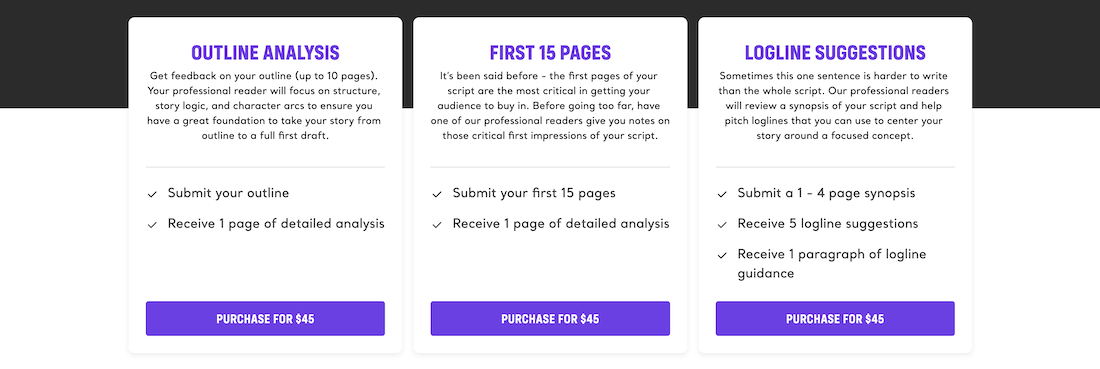Does Hollywood Really Care About the Page Count of Your Script?

I’ve covered this topic before, but I really want to give you the perspective of a professional screenwriter who has to deal with page count issues every single day.
Before we get into that part of the topic, let’s discuss things from your perspective as a budding screenwriter looking to break into Hollywood via spec scripts.
Why Page Count Matters in Spec Scripts
As you should already know, spec scripts are the screenplays you write in hopes of selling them to studios, networks, production companies, and streamers. You’re not getting paid to write them. You’re also likely a screenwriter who hasn’t broken through those Hollywood walls yet.
Spec scripts are calling cards—writing samples that display your screenwriting talent and ideas.
The spec market is best defined as the number of screenplay submissions out there at any given time—all of which are being submitted, considered, and shopped through the studio, network, streamer, agency, and management systems.
Because there are so many spec scripts out there (and so many screenwriters trying to sell them or, even more likely, use them as calling cards to get hired for writing assignments), there’s a necessary series of filtration systems to weed out the unworthy or unready.
Script Readers
The filtration system usually starts with script readers. Now, script readers can be specific readers tasked with doing one job—reading and writing coverage for scripts.
But they can also be interns, assistants, junior executives, senior executives, producers, agents, and managers. Basically, when you see me use the term script readers, just assume I mean anyone in the industry reading your script.
Read More: A Screenwriter’s Guide to Script Coverage
Hollywood Has Logical Reasons to Worry About Page Counts
Hollywood knows scripts. Industry insiders (script readers of all kinds) read hundreds of scripts a month and have done so for years.
In short, script readers know when a script is lacking fairly fast. It can be tell-tale signs like consistently horrible grammar and format, poor structure, cringe-worthy on-the-nose dialogue, and sometimes it’s as easy as looking at the page count.
Before you roll your eyes and scoff (or bring up some Academy Award-winning script that you saw online, which had 160 pages), there are reasons why page counts matter:
- The more pages there are the more production necessary (i.e. MORE MONEY THEY HAVE TO SPEND)
- The more pages there are the longer the running time of the eventual film (i.e. LESS SCREENINGS FOR THEATRICAL RELEASES, WHICH TRANSLATES TO FEWER TICKETS SOLD)
- “Wait, but so many movies are going directly to streaming channels, so that doesn’t matter…” Sure it does. Streamers want movies that people will click on and view. Many people don’t want to watch a 2.75-3+ movie… even at home (insert eye roll towards the mass audience).
- The more pages there are coming from a newb can mean the writer doesn’t know general guidelines and expectations.
- The more pages there are coming from a newb means the story is likely overwritten and not worth the time compared to another writer that knows pace count matters (at least to Hollywood)
As you can hopefully see, there are viable reasons why a script’s page count matters.
The General Guideline of Screenplay Page Count
These are generalities—but Hollywood lives by them, so you need to as well if you want to work and play in the pro-screenwriting sandbox.
One Script Page Equals One Minute of Screentime
This is an age-old Hollywood barometer, and there’s some weight to it.
Sure, it varies:
- Dialogue Density: Dialogue takes time to deliver, so dialogue-heavy pages can actually run longer than one minute per page.
- Action Sequences: Sometimes scene description takes up a lot of space for action sequences and sometimes a single line of description for an action sequence can take up multiple minutes.
- Post-Production Editing: Editing can lengthen or shorten a page.
- Cinematic Techniques: Slow-motion, montages, and other filming techniques can alter a single page’s actual runtime.
Believe it or not, one page typically translates to one minute. A 90-page script is perfect for an hour-and-a-half movie—although you usually want to add another 10 pages because of the reasons mentioned above, regarding screen minutes being longer than the page.
I write Lifetime thrillers for a living (ten produced so far over the last few years). My contract states that I need to deliver no less, and no more, than 100 pages. That’s the guideline. Why? Because the actual television movies need to be around 90 minutes long to fit into a 2-hour block of television with room for commercials.
Hence, for the network, page count really does matter.
It also matters to studios and distributors. Don’t listen to anyone who says it doesn’t (even celebrated and highly successful screenwriters who don’t necessarily have to worry about those stipulations… I’m talking about the top 1% like Quentin Tarantino, Aaron Sorkin, etc.).
Page Count Matters to Production Execs, Production Managers, and Accountants, Too
Production has its own language, spoken by everyone from production assistants to star actors and up to the director—and everything in between.
“How many pages are we shooting today?”
That’s a common thing you’ll hear on set. Sometimes it’s a quarter of a page, sometimes it’s ten pages. But if that question—specifically involving the number of script pages—is a common topic of conversation, then you have to realize that, yes, page count matters.
Why? As we discussed above, one page equals money that needs to be spent. In fact, one line of scene description or dialogue costs money.
Here’s an insider's point of view on this. When I hand in my “final” draft and the movie gets greenlit, I know a production rewrite is coming. Why? Because they are going to look for every way they can to save money. Most of the time, that means combining scenes or cutting pages (usually a mixture of both).
For the umpteenth time—page count matters.
Script Page Count From a Pro Script Reader’s Perspective
Before I hit it off as a pro screenwriter, I worked on the other side of the table in development for Sony Pictures. I was a pro script reader, paid by the studio to read scripts and write coverage.
Let me tell you this: IF YOU IGNORE PAGE COUNT GUIDELINES AND EXPECTATIONS, YOUR SCRIPT WON’T BE READ THOROUGHLY. AND IF IT IS, IT WILL BE SCANNED AND NOT TRULY EXPERIENCED. AND IN THE COVERAGE, IT’LL BE A PASS BECAUSE YOU DIDN’T FOLLOW GENERAL GUIDELINES AND EXPECTATIONS.
Again, there’s a filtration system. Why would you do anything to cause a red flag to be tripped when it comes to your script?
Script Page Count From a Pro Screenwriter’s Perspective
So let’s back things up a bit because I know some of you are thinking, “Well, I’m not even close to having anyone worry about how much my script is going to cost, so I’m just going to follow my instincts, and the advice of that one popular screenwriter on that writing conference Q/A, and not worry about page count. I’ll just vomit out my story and worry about it later.”
My biggest and best advice in hindsight after 20 years in the screenwriting trade—with 10 professional and produced (two are about to be) contracts between 2021 and 2024 (with more on the way)—is this: You need to train to write like a pro screenwriter.
Pushing that training off by writing overly long scripts and vomiting out terrible drafts will get you nowhere.
Start now. I implore you. Trust me. Learn to train yourself how to write fast, and well. (Check out my eBook on how to write lighting fast. If you want to learn how to be able to write under strict deadlines, let this book be the guide you need. Learn from it, take what you like, ditch the rest, and create your own process using the shared guidelines and perspectives.)
How Long Should a Screenplay Be?
I guess we should get into the specifics.
It’s fairly simple—for features, 90 to 115 pages is the sweet spot.
- Fewer is too few.
- A few more is too much.
- Fewer means you have room to add more characterization or more cinematic magic.
- A few more means you can cut the fat from your script just a bit more and make it a lean cinematic meal.
Don’t fall into the trap of trying to reason your overly-long (or short) page length while comparing it to highly successful scripts of the past.
- Older scripts were written in different times and formats.
- Oscar-winning scripts are often written by established screenwriters who have some leeway or auteurs who have final cut written in their contract.
- Published or leaked scripts aren’t always the final shooting scripts (which are usually shorter).
Most story structures in feature-length screenwriting are evident because of the constraints in time and pages.
If you’re writing a novel, it’s a different platform. You can write as many pages as you’d like as an author (although there are just as many publishing industry page count guidelines to follow as well).
But when it comes to writing for film (and even episodic television), there are constraints you can’t deny. And those constraints create general structural guidelines and formulas. Page count is one of them.
Do yourself a favor and don’t push up against that—at least until you have the success and power to bend or break those “rules” a bit.
Check out our Preparation Notes so you start your story off on the right track!

Ken Miyamoto has worked in the film industry for nearly two decades, most notably as a studio liaison for Sony Studios and then as a script reader and story analyst for Sony Pictures.
He has many studio meetings under his belt as a produced screenwriter, meeting with the likes of Sony, Dreamworks, Universal, Disney, Warner Brothers, as well as many production and management companies. He has had a previous development deal with Lionsgate, as well as multiple writing assignments, including the produced miniseries Blackout, starring Anne Heche, Sean Patrick Flanery, Billy Zane, James Brolin, Haylie Duff, Brian Bloom, Eric La Salle, and Bruce Boxleitner, the feature thriller Hunter’s Creed, and many Lifetime thrillers. Follow Ken on Twitter @KenMovies and Instagram @KenMovies76
Tags
Get Our Screenwriting Newsletter!
Get weekly writing inspiration delivered to your inbox - including industry news, popular articles, and more!






























